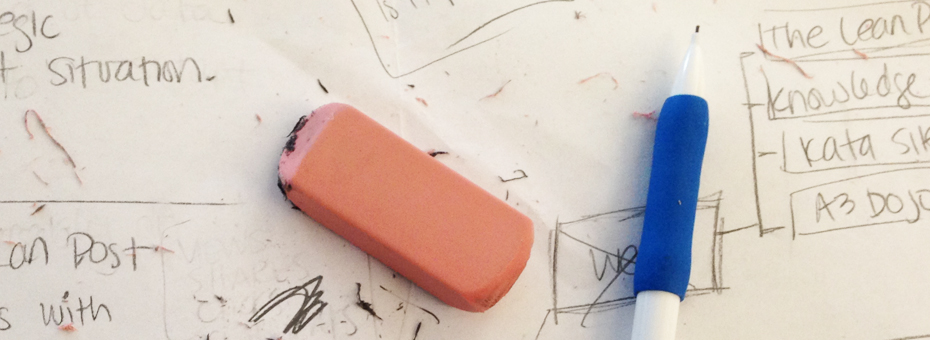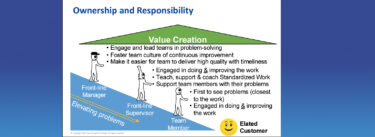“From our point of view, mistakes are a natural, daily situation, so we try to help people let go of shame when they make a mistake. All we ask is that the person recognize the mistake as soon as possible and determine the roots of the problem as it’s forming.”
This is how I got to know James Goebel, chief architect and COO at Menlo Innovations, a software development company from Ann Arbor, Michigan, when I saw him speak at the 2014 Lean Transformation Summit in March (and I’m paraphrasing him here).
At first sight, I loved this man, his company, and its unique culture. I wanted to learn their magic secret, but quickly learned that there’s no secret at all. Menlo opens its doors to anyone who wants to learn how in just six years it’s managed received the prestigious Alfred P. Sloan Award for Excellence in Workplace Flexibility, given to companies that are “innovative, flexible, and effective” and considered top employers. During this same time, Menlo also grew by 300% and received a certificate of honor from Inc. for maintaining the highest level of operational excellence and profitability in the category of small and medium size companies.
Menlo’s purpose is pretty ambitious: “End human suffering in the world as it relates to technology.” Menlo has discovered it’s possible to build a user-friendly technological system for untrained users. Despite the fact that Menlo employs engineers and technology personnel, they view themselves and their work as “the Anthropology of High-Tech.” As far as they’re concerned, understanding human needs, culture, and behavior is no less necessary for development and financial success than in-depth technological and technical understanding.
When I spoke with James Goebel myself, I asked him to say more about letting go of fear of failure and anxiety over mistakes at work. He explained that in this era of uncertainty, without an inability to anticipate developments that characterize the innovation economy, feeling your way through the fog (using a methodology based on trial and error) is the most effective way to move forward. Mistakes, abnormalities, and diversions can and should serve as a basis for unexpected discoveries. They are a source of development and growth, he said. Mistakes, failures, and surprises are the basic materials that create a fertile ground for new discoveries, creativity, and disruptive-development. Indeed, “accidently-created mutation” is the foundation of evolution.
“James, the logic of your argument is clear,” I said. “But why are so few businesses actually willing to free their employees from the fear of making a mistake? How do you actually do this?” James smiled and told me that even though his academic degree is in engineering, his real interest is trying to understand the culture in which we live. He explained that the fear of being discovered making mistake is really about the social-cultural and economic price of making a mistake.
Mistake anxiety is shared by people already high up in the hierarchy who have an ambition to continue to move up the ranks and junior employees who are afraid of losing their place of work. Fear is also a natural (and often necessary) emotion that warns us about danger. It’s necessary to deal with problems as they occur in order to prevent them from turning into full-blown catastrophes. The real challenge and question, James says, is how to prevent the slippery slope into paralyzing anxiety that can happen. “Innovation safety nets” help organizations do this for employees.
I thought of the proverb, “Blessed is the man who always fears; but one who hardens his heart falls into trouble.” (28:14). A person who hardens his heart and ignores his fear will not be careful and will fall down. In his Summit learning session, James reminded us that shame, a loss of confidence, and even a feeling of failure are to be expected after making a mistake. This warning system provides effective caution and keeps us alert. But all too easily it can turn into needless anxiety that cuts one off and freezes free thinking.
At Menlo, they use two strategic foundations to root out fear while encouraging scientific thinking. First, they use empirical scientific experimentation. Managers encourage people to deal with problems openly as they come up, using problems to accumulate knowledge. Menlo asks people to try to find the root causes of problems and works with team members to speed up the process. Discovering problems early on makes it easier to deal with them and prevent disasters. James says experienced software professionals know what creating software for development of products is like at most companies: deviations from implementing the program and missing schedules are the norm. But not at Menlo. “We break software down into its smallest components and check their operation over hours and days,” he says. “As a result, we discover diversions or deviations quickly and early.”
“The second strategy is personal and folklorist,” James told us, a smile returning to his face. At the beginning of their work in Menlo, after a few serious failures, someone blamed him, saying “James screwed up the project. Instead of defending himself, he just said, “Of course.” And since then, every time an experiment doesn’t succeed, James says he’s happy to hear “James screwed up the project” resounding through the corridors. He’s become the punching bag and the essential safety net that lets the rest of the team experiment, make mistakes, and learn. He doesn’t mind this since learning is the purpose of their work.
After James’ presentation, I thought to myself, how can I get this message across to my colleagues in Israel? How can I explain the importance of a manager who’s willing to take the blame, be the safety net, and thus free up his workers from the shame that too often goes along with making mistakes? How can we all create innovation safety nets for each other? These are things we need if we really want to innovate. What we don’t need are more managers who don’t let people pose questions before deciding on a solution. People need to feel free to experiment and learn through trial and error.
“At Menlo we’re convinced that fear of making a mistake is the worst mistake of all,” James said. “The assumption that there is a faultless plan’ or a ‘perfect managerial decision’ that solves the problem and makes it unnecessary to experiment is a dangerous gamble. The fear of making a mistake is a self-fulfilling prophecy. You’re welcome to see for yourself.”
I didn’t need another invitation. As we said goodbye, I knew that we’ll be meeting again this summer.
Read a profile of Menlo Innovations in Inc. Check out Lean Product and Process Development, which features a new case study on Menlo Innovations.





